Bringing Native American healing practices to the university
Supporting tribal communities and integrating Native practices is a longtime personal, professional commitment for many at UArizona Health Sciences.
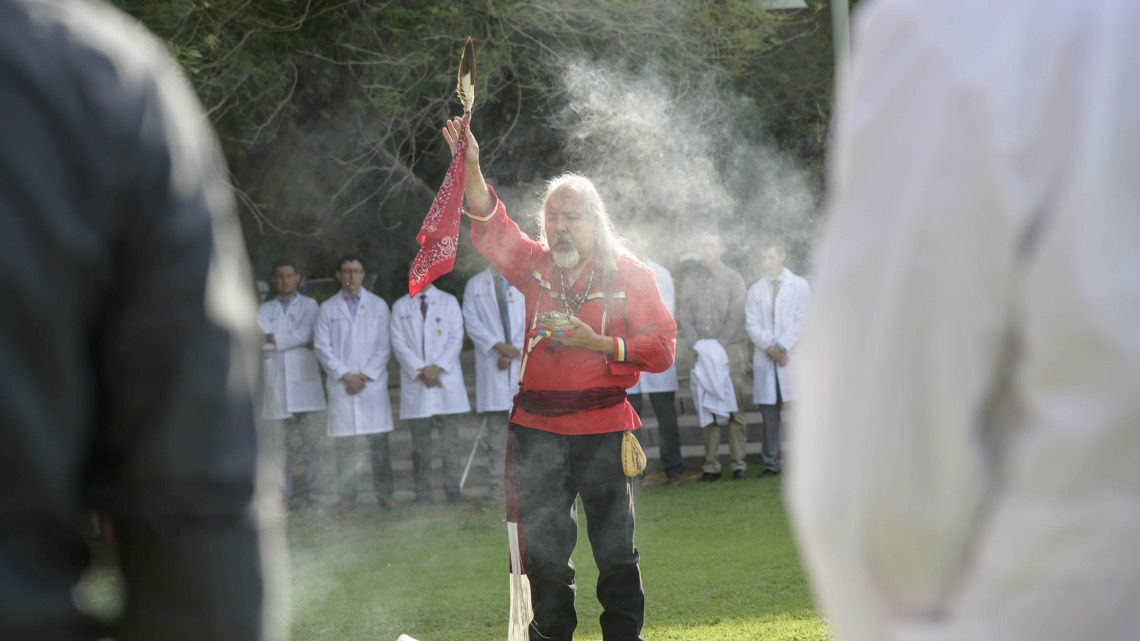
Carlos Gonzales, MD, FAAFP, conducts ceremonies on the University of Arizona Health Sciences campus that incorporate Native American traditions.
The two medical students came to Carlos Gonzales, MD, FAAFP, looking for help.
Both Native American, one was a young Navajo woman troubled by the idea of learning anatomy on a donated body because of tribal traditions.
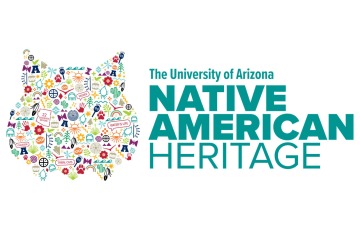
“They asked me to come do a blessing,” said Gonzales, assistant vice president of Indigenous affairs and an associate professor in family and community medicine in the University of Arizona College of Medicine – Tucson whose father is Pascua Yaqui.
Other students approached Gonzales for similar blessings and before long, the Tree Blessing Ceremony was born. Now in its 12th year, the annual start-of-fall semester event is a cherished tradition honoring those who donate their bodies through the UArizona College of Medicine – Tucson Willed Body Program while also welcoming students, faculty and staff to a fresh academic year. Held at both the College of Medicine – Tucson and UArizona College of Medicine – Phoenix, the ceremony is meant to foster community between Indigenous and non-Indigenous participants.
Anatomy professors who had been to the tree blessing later approached Gonzales about doing a similar ceremony for undergraduate students in a summer anatomy class. It is one of several regular ceremonies he performs.
November is Native American Heritage Month, a time specifically set aside to celebrate diverse cultures, traditions and histories while also raising awareness about the unique challenges native tribes face. For UArizona Health Sciences faculty and staff members, promoting inclusion and understanding of Native American traditions helps to better serve the state’s tribal communities and improve those relationships.
Closing the gap
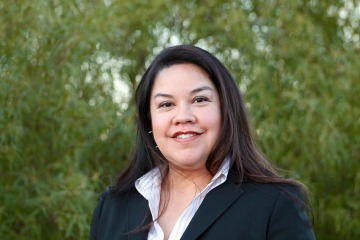
Christina C. Bell Andrews, JD, MPH, MBA, MA, is a former tribal leader for the Tohono O’odham Nation and in May was named executive director of the Wassaja Carlos Montezuma Center for Native American Health at the UArizona College of Medicine – Tucson’s Department of Family and Community Medicine.
One way to bridge across cultures is through education and understanding, which can be a challenge when the views of tribes and states are different, said Christina C. Bell Andrews, JD, MPH, MBA, MA, executive director of the Wassaja Carlos Montezuma Center for Native American Health in the UArizona College of Medicine — Tucson’s Department of Family and Community Medicine. The Center uses an Indigenous-led framework in its mission to conduct health-related research and training projects that will improve the quality of life, including health and social justice outcomes, for Native Americans using a culturally appropriate, holistic approach.
Andrews, who is Hia-Ced O’odham and Pascua Yaqui and a member of the Tohono O’odham Nation, said she was raised to view people as intrinsically intertwined with their environment.
“We are one with nature, with our animals, we don't see a distinction that we're different,” she said. “That's why we don't want to harm the land because it gives us food, it gives us our ceremonies, it gives us our existence.”
Being open to understanding different viewpoints without judgment helps both non-Native and Native American sides find common ground, she said.
“We’ve got to figure out how do we live in harmony with each other,” Andrews said. “Honestly, how do we do that? We’re respectful of each other’s views.”
Uniting all
It’s long been Gonzales’s mission to integrate Native and Western healing practices.
To help new Native American medical students feel more comfortable in college, he brings in a Pascua Yaqui medicine man to offer blessings. The students each receive a prayer feather that has been blessed and bestowed with good energy. Four years later, when the students head to their residencies, Gonzales holds an honoring ceremony. The medicine man offers blessings once again, and students are given a colorful blanket, symbolic of their bright futures and protection for them and their patients. They also receive a pascola mask – which Pascua Yaqui sacred clowns and dancers wear – to remind the future doctors that they’re not perfect and should use humor to help patients.
Gonzales, who lives outside Nogales, Arizona, has also hosted sweat lodge ceremonies for those who’ve expressed an interest in learning more about traditional medicine. He’s welcomed students, faculty and residents and has a waiting list of people who want to take part in the five-hour ceremony.
Paying attention to the whole person
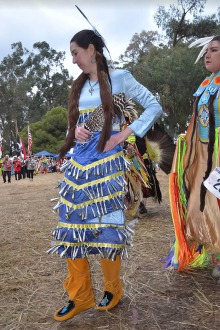
Friends taught Jennifer Erdrich, MD, MPH, MFA, FACS, FSSO, the steps to the jingle dance. Erdrich’s father is Turtle Mountain Ojibwe, and she still spends summers with his family in North Dakota. (Courtesy Jennifer Erdrich)
As a child, Jennifer Erdrich, MD, MPH, MFA, FACS, FSSO, spent every summer with her father’s family in North Dakota, learning traditional Turtle Mountain Ojibwe beadwork at her grandmother’s side. She volunteered with Indian Health Services as a teen and took American Indian studies in college. Erdrich, a surgical oncologist and assistant professor with the Division of Surgical Oncology at the UArizona College of Medicine – Tucson, has also devoted time researching historical policies regarding Native American health care. All of this shapes her professional life.
“My upbringing taught me to be attentive to the whole person, to consider the mind, body and soul, and I think that heavily influences how I approach patient care and thereby how I teach students,” said Erdrich, a member of the UArizona Cancer Center who is the only Native American board-certified surgical oncologist in the United States. “Our Western curriculum often emphasizes a focused approach, but I was exposed to traditional healers and other forms of wisdom, which gave me respect for broader forms of medicine.
“Common to many Native American cultures is the prioritizing of community above self. This has influenced my work ethic in that service to my patients comes before all else, their needs before mine. This means that in an era popularizing the individual and wellness and streamlined care, I'm teaching community, dedication and holistic health as the most important principles.”
Making connections
Historically Native Americans have suffered disparities in health and health care. According to the Centers for Disease Control and Prevention, American Indians die 12-13 years earlier than white Americans. Native Americans have higher death rates in most age ranges, especially younger ones while the CDC cites higher instances of several types of cancer. But progress is being made, said Monica Yellowhair, PhD, interim associate director of community outreach and engagement and tribal relations for the UArizona Cancer Center’s Office of Community Outreach and Engagement.
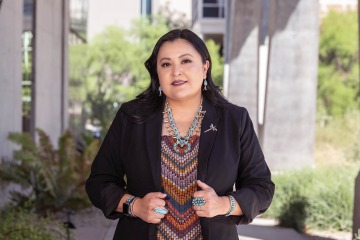
Monica Yellowhair, PhD, interim associate director of community outreach and engagement and tribal relations for the UArizona Cancer Center’s Office of Community Outreach and Engagement, says Native American communities have been excited by and receptive to UArizona’s outreach efforts.
Yellowhair said while one of the Center’s initiatives focuses on cancer education coupled with outreach and support, the tribal communities themselves guide the efforts and offer feedback to make sure the projects are truly beneficial.
“It’s them letting us know what they need,” she said.
In 2020, the UArizona Cancer Center received a $3 million, three-year award from the Cancer Moonshot initiative to increase colorectal cancer screening in Arizona’s Native American communities. Erdrich said the goal was to improve the number of eligible screenings by 25 percent. Some sites saw improvement of more than 100 percent.
Gonzales said he’s heartened to see UArizona’s inclusion, such as during the season opening football game against Northern Arizona University on Sept. 2 when four O’odham tribes took part in pre- and mid-game ceremonies.
“To see people incorporated is really, to me, beautiful."
The University of Arizona Health Sciences Office of Equity, Diversity and Inclusion’s speaker series for Native American Heritage Month features UArizona leaders who will talk about their career paths as well as what they’re doing to positively impact Native American local and national communities.
Registration links can be found at: https://diversity.uahs.arizona.edu/events
The schedule:
Nov. 30, 11 a.m. Felina Cordova-Marks, DrPH, MPH, MSC

